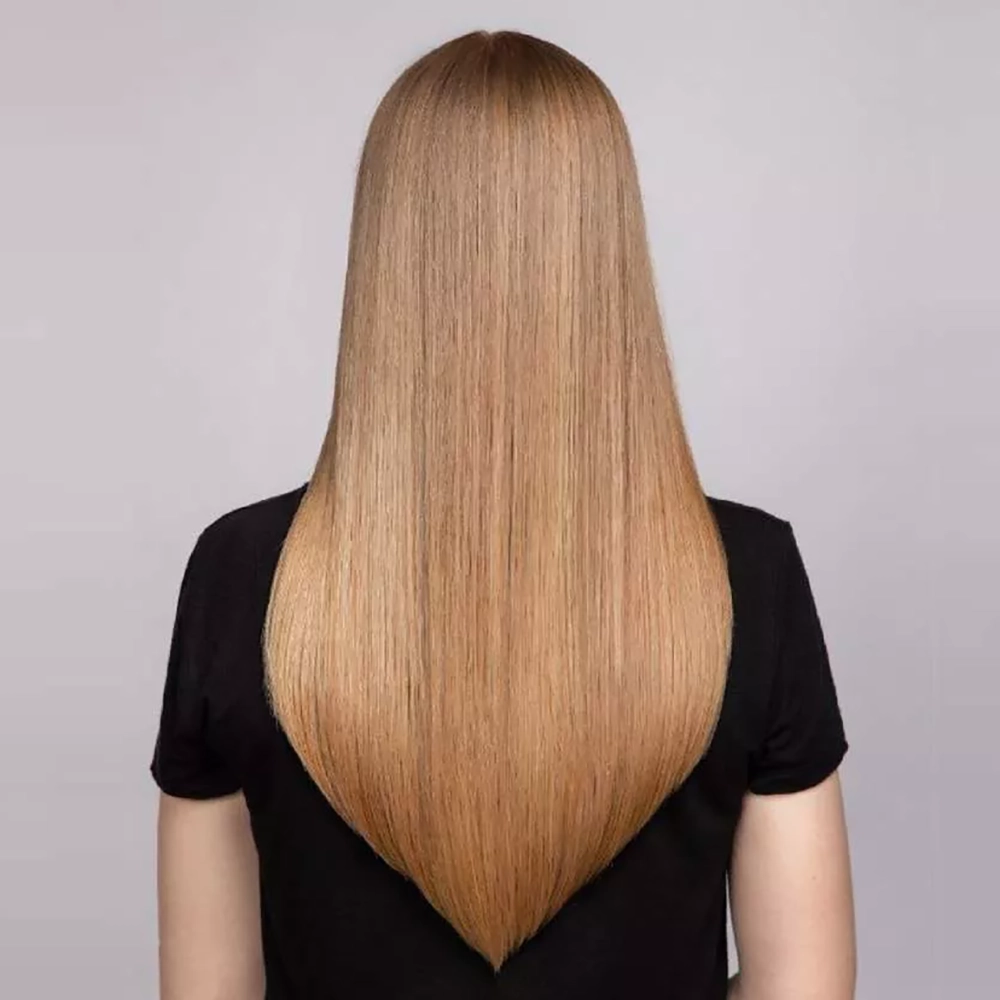Understanding the role of vitamins in hair growth
When it comes to maintaining healthy and vibrant hair, vitamins play a crucial role. Our hair follicles require a variety of vitamins to grow and function properly. From promoting a healthy scalp to strengthening hair strands, vitamins have a significant impact on the overall health of our hair. In this blog post, we will explore the role of vitamins in hair growth and how they contribute to the luscious locks we desire.
First and foremost, let’s talk about vitamin A. This essential vitamin is known for promoting a healthy scalp, which is the foundation for strong and beautiful hair. Vitamin A helps in the production of sebum, an oily substance that moisturizes the scalp and prevents dryness. Additionally, it aids in the development of keratin, a protein that makes up the structure of hair strands. Including foods rich in vitamin A, such as carrots, sweet potatoes, and spinach, in your diet can help improve the overall health of your hair.
Next on the list are the B vitamins. B vitamins, particularly biotin and niacin, are widely recognized for their role in hair growth. Biotin, also known as vitamin B7, helps in the production of keratin, making hair strands stronger and more resilient. Niacin, or vitamin B3, promotes blood circulation to the scalp, ensuring that hair follicles receive an adequate supply of nutrients. Foods like eggs, nuts, and leafy greens are excellent sources of B vitamins and should be included in your diet for optimal hair health.
Another key player in the realm of hair growth is vitamin C. This vitamin not only strengthens hair follicles but also aids in the production of collagen, a protein responsible for the structure and elasticity of hair strands. It also acts as an antioxidant, protecting the hair from damaging free radicals. Oranges, strawberries, and bell peppers are just a few examples of vitamin C-rich foods that can promote healthy hair growth.
Vitamin D is essential for regulating the hair growth cycle. It helps in the activation of hair follicles and stimulates the production of new hair cells. Research has shown a correlation between vitamin D deficiency and hair loss, making it crucial to maintain optimal levels of this vitamin. While sunlight is a natural source of vitamin D, incorporating foods like fatty fish and fortified dairy products into your diet can also provide the necessary dose of this vitamin for healthy hair growth.
| Vitamins | Role in Hair Growth | Foods |
|---|---|---|
| Vitamin A | Promotes a healthy scalp and aids in the production of keratin | Carrots, sweet potatoes, spinach |
| B vitamins | Biotion strengthens hair strands, niacin promotes blood circulation | Eggs, nuts, leafy greens |
| Vitamin C | Strengthens hair follicles, aids in collagen production | Oranges, strawberries, bell peppers |
| Vitamin D | Regulates hair growth cycle and activates hair follicles | Fatty fish, fortified dairy products |
In addition to vitamins, minerals like zinc and iron also play a crucial role in promoting hair health. Zinc helps in the production of new cells and prevents hair loss, while iron promotes the flow of oxygen to the hair follicles, stimulating hair growth. Including foods such as oysters, red meat, and lentils in your diet can provide the necessary amounts of these minerals for healthy hair.
Lastly, when choosing multivitamin supplements for hair growth, it’s important to look for formulations that contain a comprehensive blend of vitamins beneficial for hair health. Consulting with a healthcare professional or a trichologist can help you determine which supplements are most suitable for your individual needs.
In conclusion, understanding the role of vitamins in hair growth is essential for maintaining healthy and thriving locks. From vitamin A to vitamin D, these essential nutrients contribute to the overall health of our hair follicles, strengthen strands, and regulate the hair growth cycle. By incorporating a balanced diet rich in vitamins and minerals, we can optimize the health of our hair and achieve the radiant locks we desire.
Vitamin A: Promoting healthy scalp and hair
Vitamin A plays a crucial role in promoting a healthy scalp and hair. This important nutrient is well-known for its various benefits to overall health, but its impact on hair growth should not be overlooked. The scalp and hair follicles require a good supply of nutrients to maintain their health and functionality, and vitamin A is essential in this process.
First and foremost, vitamin A helps in the production of sebum, an oily substance that moisturizes the scalp and keeps the hair strands well-nourished. A deficiency in vitamin A can lead to a dry scalp, which can result in itching, flakiness, and dandruff. By ensuring an adequate intake of vitamin A, you can prevent these scalp issues and promote a healthier environment for hair growth.
In addition to moisturizing the scalp, vitamin A also supports the growth and development of hair follicles. Hair follicles are responsible for producing new hair strands, and they require a sufficient nutrient supply to function optimally. Vitamin A helps in this process by promoting the production of unsaturated fatty acids, which are vital for healthy hair growth. Therefore, incorporating vitamin A-rich foods into your diet can encourage stronger and faster hair growth.
The significance of B vitamins for hair growth
B vitamins play a crucial role in promoting hair growth and maintaining overall hair health. These vitamins are essential for the proper functioning of the body, including the growth and development of hair follicles. There are several types of B vitamins, each with its own unique benefits for hair growth.
Vitamin B1 (Thiamine): This vitamin helps in improving blood circulation to the scalp, ensuring that the hair follicles receive an adequate supply of oxygen and nutrients. It also supports the production of collagen, which is important for hair strength and elasticity.
Vitamin B7 (Biotin): Biotin is widely known for its role in promoting healthy hair, skin, and nails. It helps in the production of keratin, a protein that forms the structure of hair strands. Biotin also aids in the prevention of hair breakage and promotes hair growth.
Vitamin B12 (Cobalamin): Deficiency of vitamin B12 can lead to hair loss and premature graying. This vitamin is essential for the formation of red blood cells, which transport oxygen and nutrients to the hair follicles. Adequate levels of vitamin B12 are necessary for maintaining healthy hair growth.
Incorporating foods rich in B vitamins into your diet can help support hair growth. Some good sources of B vitamins include whole grains, nuts and seeds, green leafy vegetables, eggs, dairy products, and lean meats. However, it can be challenging to obtain all the required B vitamins through diet alone. In such cases, supplements can be a convenient option to ensure adequate intake.
- Look for multivitamins: Choose a multivitamin supplement that contains a balanced combination of B vitamins. This ensures that you are getting the right amount of each vitamin for optimal hair growth.
- Check the dosage: Make sure to check the dosage of B vitamins in the supplement. The recommended daily intake may vary depending on factors such as age, sex, and overall health.
- Consider your needs: If you are specifically targeting hair growth, look for supplements that are formulated for hair health. These may contain higher concentrations of B vitamins and other nutrients beneficial for hair growth.
While B vitamins are essential for hair growth, it is important to remember that they work in synergy with other nutrients. A well-balanced diet, along with a healthy lifestyle, is crucial for maintaining optimal hair health. If you have any concerns about your hair growth or overall health, it is always recommended to consult with a healthcare professional.
| Vitamin | Benefits for Hair Growth | Food Sources |
|---|---|---|
| Vitamin B1 (Thiamine) | Improves blood circulation to the scalp | Whole grains, nuts, seeds, lean meats |
| Vitamin B7 (Biotin) | Supports the production of keratin | Eggs, dairy products, nuts and seeds |
| Vitamin B12 (Cobalamin) | Prevents hair loss and premature graying | Fish, shellfish, lean meats, dairy products |
Vitamin C: Strengthening hair follicles and strands
Vitamin C is an essential nutrient that plays a crucial role in maintaining the overall health of your hair. It not only strengthens the hair follicles but also promotes the growth of healthy and strong strands. This powerful antioxidant aids in the production of collagen, a protein that is essential for the structure of hair.
Collagen is a major component of the hair shaft and is responsible for its strength and elasticity. By enhancing collagen production, vitamin C helps in strengthening the hair follicles, preventing breakage, and promoting healthier strands. It also aids in maintaining the integrity of the hair strands by protecting them from damage caused by environmental factors such as pollution and UV rays.
In addition to its collagen-boosting properties, vitamin C also helps in improving blood circulation to the scalp. This increased blood flow ensures that the hair follicles receive an adequate supply of nutrients and oxygen, which are essential for their growth and health. By nourishing the hair follicles, vitamin C encourages the production of strong and healthy strands.
List of Benefits of Vitamin C for Hair:
- Strengthening hair follicles: Vitamin C enhances collagen production, which strengthens the hair follicles, making them less prone to breakage.
- Promoting hair growth: By improving blood circulation to the scalp, vitamin C ensures that the hair follicles receive essential nutrients and oxygen, promoting hair growth.
- Preventing hair damage: The antioxidant properties of vitamin C protect the hair strands from damage caused by free radicals, pollution, and UV rays.
- Improving hair texture: Regular intake of vitamin C can result in improved hair texture, making it softer, smoother, and more manageable.
- Boosting overall hair health: By supporting collagen production, vitamin C contributes to the overall health and vitality of your hair.
Table of Foods Rich in Vitamin C:
| Food Source | Vitamin C Content (per 100g) |
|---|---|
| Oranges | 53.2mg |
| Kiwi | 92.7mg |
| Strawberries | 58.8mg |
| Pineapple | 47.8mg |
| Guava | 228.3mg |
Adding foods rich in vitamin C to your diet can significantly improve the health of your hair. Some excellent sources of vitamin C include oranges, kiwi, strawberries, pineapple, and guava. You can also consider taking vitamin C supplements after consulting with your healthcare provider.
To conclude, vitamin C is an essential nutrient for the strengthening of hair follicles and the promotion of healthy strands. Its collagen-boosting properties and ability to improve blood circulation to the scalp make it a vital component in maintaining the overall health and growth of your hair. Incorporate vitamin C-rich foods into your diet or consider taking supplements to enjoy the numerous benefits it offers for your hair.
Vitamin D: Regulating hair growth cycle
Vitamin D plays a vital role in the regulation of hair growth cycle. This key nutrient not only helps maintain healthy hair but also promotes proper hair growth and development. Adequate intake of vitamin D is crucial for preventing hair loss and ensuring the strength and vitality of your strands.
One of the main ways in which vitamin D regulates hair growth is by stimulating hair follicles. Hair follicles are responsible for producing new hair and maintaining the growth cycle. Vitamin D promotes the activation of hair follicles, which in turn leads to the production of thicker and healthier hair.
In addition to stimulating hair follicles, vitamin D also plays a role in preventing hair loss. Research has shown that a deficiency in vitamin D can contribute to hair loss and thinning. This is because vitamin D helps regulate the hair growth cycle and prevents the premature shedding of hair.
Furthermore, vitamin D is essential for maintaining a healthy scalp, which is vital for optimal hair growth. A healthy scalp provides the ideal environment for hair follicles to thrive and produce strong, lustrous hair. Vitamin D helps in the regulation of sebum production on the scalp, preventing dryness and itchiness.
When it comes to ensuring an adequate intake of vitamin D for hair growth, there are a few options to consider. Firstly, exposure to sunlight is an excellent source of vitamin D. Spending some time outdoors each day, especially during the early morning or late afternoon, can help your body produce vitamin D naturally.
Alternatively, you can obtain vitamin D through your diet. Foods such as fatty fish (like salmon and mackerel), fortified dairy products, eggs, and mushrooms contain good amounts of vitamin D. Including these foods in your diet can help you maintain optimal levels of vitamin D for healthy hair growth.
In some cases, supplements may be necessary to ensure adequate vitamin D levels. If you suspect that you have a vitamin D deficiency or are unable to obtain enough vitamin D through sunlight and diet alone, consult with a healthcare professional. They can assess your vitamin D levels and recommend an appropriate supplement dosage if needed.
In conclusion, vitamin D plays a crucial role in regulating the hair growth cycle. By stimulating hair follicles and preventing hair loss, vitamin D promotes healthy and vibrant hair. Ensuring an adequate intake of vitamin D through sunlight, diet, or supplements can help you maintain optimal hair health and growth.
Zinc and iron: Essential minerals for hair health
Zinc and iron are essential minerals for maintaining overall hair health. These minerals play a vital role in improving hair growth, preventing hair loss, and promoting strong and shiny hair.
The Importance of Zinc:
Zinc is an essential mineral that is necessary for numerous bodily functions, including hair growth. It plays a crucial role in the production of new cells, including hair cells. Zinc helps to stimulate hair follicles, ensuring healthy growth and preventing hair thinning and loss. Additionally, it plays a pivotal role in maintaining the oil-secreting glands around the hair follicles, preventing dandruff and dry scalp.
The Role of Iron:
Iron is another mineral that is indispensable for healthy hair. It is a core component of hemoglobin, which carries oxygen to the body’s tissues, including the hair follicles. Adequate iron levels ensure that the hair follicles receive sufficient oxygen and nutrients, promoting hair growth and preventing hair breakage and dullness. Iron deficiency can lead to hair loss, as the hair follicles become weak and unable to produce strong and vibrant hair.
Getting Sufficient Zinc and Iron:
To ensure your hair receives an adequate supply of zinc and iron, it is essential to consume a balanced diet that includes foods rich in these minerals. Some excellent food sources of zinc include oysters, beef, lamb, pumpkin seeds, and lentils. Similarly, iron-rich foods include spinach, red meat, poultry, beans, and fortified cereals.
Consider Supplements:
In some cases, it may be challenging to obtain sufficient zinc and iron through diet alone. In such situations, considering multivitamin supplements can be beneficial. However, it is crucial to consult with a healthcare professional before starting any supplements to ensure they are suitable for your specific needs.
| Zinc-Rich Foods | Iron-Rich Foods |
|---|---|
| Oysters | Spinach |
| Beef | Red Meat |
| Lamb | Poultry |
| Pumpkin Seeds | Beans |
| Lentils | Fortified Cereals |
In conclusion, zinc and iron are indispensable minerals for maintaining healthy hair. Ensuring sufficient intake of these minerals through a balanced diet or supplements can help promote hair growth, prevent hair loss, and enhance the overall health and appearance of your hair.
Choosing the right multivitamin supplements for hair growth
In today’s world, where self-care and wellness have taken the forefront, it’s no surprise that people are also seeking ways to maintain healthy and lustrous hair. One way to achieve this is by incorporating multivitamin supplements into our daily routine. But with so many options available in the market, how do we choose the right multivitamin supplements for hair growth? Let’s explore some factors to consider before making that decision.
First and foremost, it’s crucial to understand that not all multivitamin supplements are created equal. Each supplement contains a different combination of vitamins, minerals, and nutrients that contribute to overall hair health. Vitamins play a crucial role in hair growth by providing the necessary nutrients to support the hair follicles and strands.
When choosing a multivitamin supplement for hair growth, it is important to look for specific vitamins and minerals that have proven benefits. For instance, Vitamin A promotes a healthy scalp and hair by stimulating the production of sebum, a natural oil that lubricates the scalp and keeps the hair moisturized. Similarly, Vitamin C strengthens the hair follicles and strands by enhancing collagen production, which is vital for hair growth.
- Vitamin D plays a significant role in regulating the hair growth cycle. A deficiency in this vitamin can lead to hair thinning or even hair loss.
- Zinc and iron are two essential minerals that are important for hair health. Zinc helps in the production of new hair cells, while iron ensures proper oxygenation and circulation to the hair follicles.
When selecting a multivitamin supplement, it is also important to consider the overall quality and reputation of the brand. Look for supplements that are manufactured by reputable companies and are backed by scientific research. Additionally, consulting with a healthcare professional or a nutritionist can help you determine the right dosage and combination of supplements based on your individual needs.
| Key Points to Consider: |
|---|
| 1. Not all multivitamin supplements are equal; each contains a different combination of vitamins and minerals. |
| 2. Look for specific vitamins like Vitamin A, C, D and minerals like zinc and iron. |
| 3. Consider the overall quality and reputation of the brand. |
| 4. Consult with a healthcare professional or nutritionist for personalized guidance. |
Choosing the right multivitamin supplement for hair growth is a decision that should be made with careful consideration. By understanding the role of different vitamins and minerals and selecting a high-quality supplement, you can provide your hair with the necessary nutrients to thrive. So, take charge of your hair health today and choose the multivitamin supplement that’s right for you!




































